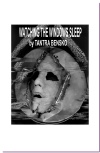
Spencer Dew
Tantra Bensko is identified in her bio as someone who “teaches Experimental Fiction Writing through colleges, online,” and on this chapbook’s title page she is identified as “Tantra Bensko, MFA.” These credentialing gestures may be absurd, the bow tie on the decorative column, the tattered top hat on the performing corpse, but I fear there is no wink, no knowing Dadaist smile, behind either line. The “Experimental,” with the capital E, and the MFA, a capital accomplishment, are meant in dread earnest, and meant to impress. As, unfortunately, is the content of the chapbook, stories about fragments of dreams and/or the physics and phenomenology thereof. “In the future, you will forget it, in the past you have forgotten it, so I know the secret will be safe if I keep it in the present. The present will enfold it and keep it mine, and yet I can revel in the telling of it.” This about says it all, as Watching the Windows Sleep is characterized by an earnest reveling on the part of its self-identified Experimental author, but likely will not linger long in the reader’s mind.
“How many worlds intersect here? How many worlds are dreaming of other worlds?… How do YOU appear in those worlds? As a shadow of a cloud? As a sound of unusually melodic wind?” Fair questions, but what I longed to encounter more of in this chapbook was something like an answer, however enigmatic. Consider the “lucid windows” washed down with frothing cream, flashing significant scenes to a cigar-smoking man in a yellow suit who just happens to be wandering by—here at least there are descriptions that can be grasped. Too often Bensko gives us a vague gloss, caving to that profoundly distancing effect of narrating a dream not shared by the person hearing the narration. “Symbols. Yet so real and lush and living, with individual emotions,” she writes at one point, “Being symbols doesn’t make them any less poignant and vibrant.” I’d love to believe this, but it just lacks spark. What if houseplants had hair? Well, that would be a situation, and perhaps a story, but a chain of rhetorical questions does not a story make.
Poetry seems to be the best way to create what you will live. Better than lists. Or affirmations. Proclamations. Colors will create your day. Color sequences become a language translated by your skin. By your stride. By your breath. Not translated into English. Into something for which there is no English word.
This is no Rimbaud, no matter how many “colors dancing and shouting and jumping, free from constriction!” get poured onto the page, mainly because there is no saturation of color in the use of the word color. Rimbaud, when he trips out his new vowels, relies rather heavily on lists, on things, anchoring the balloon of his poetry such that the reader can feel and, maybe, climb inside the basket for a ride. Instead, Bensko’s “Experimental” style gives us this:
We begin. Swirling like a backwards somersault off a swing, landing in a pool of water, sending ripples beyond all knowledge of time. This is the essence, then: heady freedom of motion between worlds of formlessness and form, that which is formed and that to be formed, and other versions of them all that call to you with clear voices from across the river banks.
It’s difficult to feel or know anything here, hard to have an experience or care or continue. “The storyteller sometimes likes to just be,” she tells us, elsewhere, and, again, that is fair enough for the storyteller, but it unfortunately leaves the reader “outside of doing something to try to make something happen. Outside of questions and answers. Just plain outside.”
Official Tantra Bensko Web Site
Official Naissance Chapbooks Web Site
Tags: Book Reviews, Naissance Chapbooks, Spencer Dew, Tantra Bensko, Watching the Windows Sleep